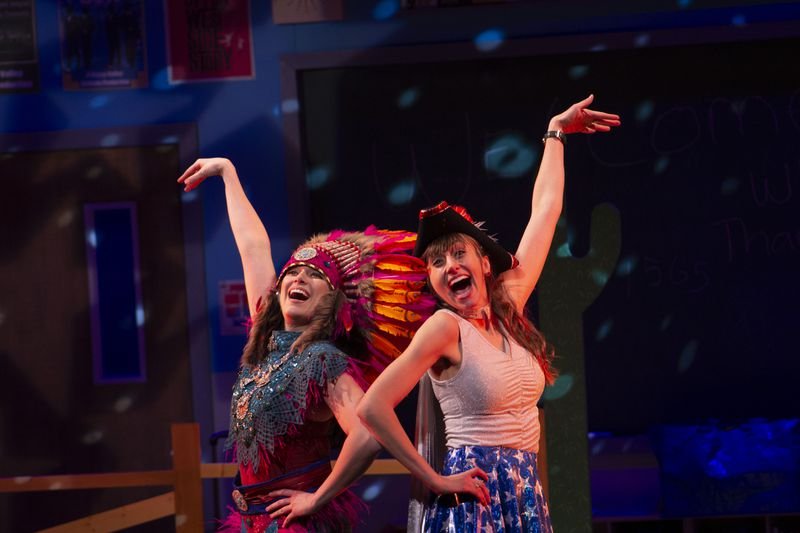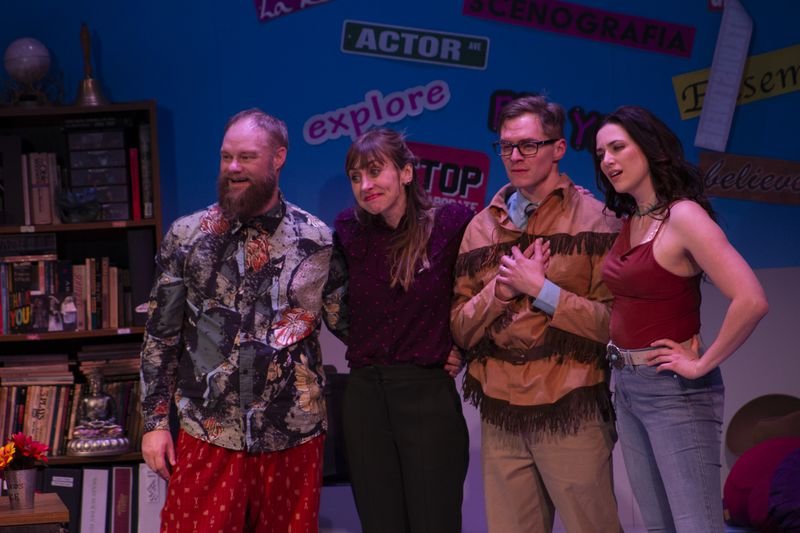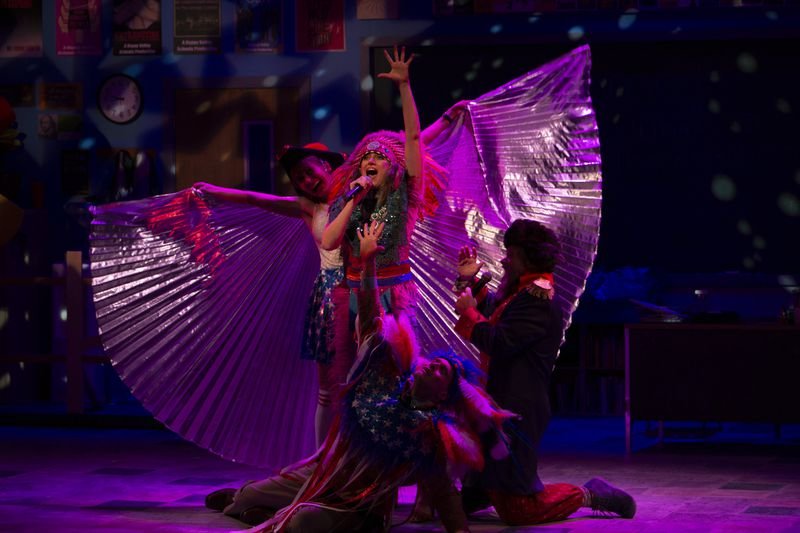By SALEEN MARTIN
THE VIRGINIAN-PILOT | JAN 31, 2022 AT 10:19 AM
Performers rehearsing for the Virginia State Company's "The Thanksgiving Play." The play was originally written by Native American playwright and choreographer Larissa FastHorse. It's showing from Jan. 19, 2022 to Feb. 6, 2022 at the Wells Theatre in Norfolk and was directed by Jessica Holt. (Courtesy of Crystal Tuxhorn)
Jessica Holt was researching Thanksgiving pageants for her current Virginia Stage Company production when she came across a revealing photo.
It was a scene from a 1920 play in which a group of white actors was dressed as pilgrims. Surrounding them were more white actors with painted faces and heads wrapped in feather headbands, an offensive portrayal of Native Americans.
“You can see how these were using redface in such damaging and corrosive ways,” Holt said.
It was the perfect preparation for “The Thanksgiving Play,” which is playing through Feb. 6 at the Wells Theatre.
The play was written by Native American playwright and choreographer Larissa FastHorse in 2015. She is based in Santa Monica, California and is a member of the Sicangu Lakota Nation.
The play is about “performative wokeness,” FastHorse said during a 2018 interview with Playwrights Horizons. The play follows four white people crafting a “culturally sensitive” Thanksgiving play for children during Native American Heritage Month.
Tom Quaintance, producing artistic director at VSC, reached out to Holt last summer. He thought Holt — a white, queer, cisgender woman — had the perspective and cultural understanding to direct the play. Holt was initially hesitant since she’s not Native, but the more she read, the more comfortable she felt.
“This play is lampooning and making fun of white folks for 90 minutes,” Holt said. “You need to have the perspective of whiteness in the room because ultimately, that’s what the play is about. It’s about these white folks that are all trying to do the right thing and are finding the limits of white progressivism.”
To direct the performance, she read up on early Thanksgiving plays and pageants, which “mystified” Native Americans and melded them into one idea when in reality, they’re quite diverse.
For example, there are currently 11 tribes recognized in Virginia, including the Mattaponi, Upper Mattaponi and Pamunkey. In Hampton Roads, members of the Nansemond tribe live in Suffolk and Chesapeake, while those in the Cheroenhaka Nottoway and Nottoway tribes live in Southampton County, according to the Commonwealth of Virginia website.
There are also groups like the Red Crooked Sky, a Virginia-based American Indian dance troupe, Holt said. The troupe is based in southeastern Virginia and represents a host of tribes, including Cherokee, Nansemond, Sioux, Meherrin, Osage, Seneca and Monacan.
Performers rehearsing for the Virginia State Company's "The Thanksgiving Play." The play was originally written by Native American playwright and choreographer Larissa FastHorse. It's showing from Jan. 19, 2022 to Feb. 6, 2022 at the Wells Theatre in Norfolk and was directed by Jessica Holt. (Courtesy of Crystal Tuxhorn)
Holt also worked with Courtney Mohler, a dramaturgical consultant who provides research and information to help produce more informed performances.
Mohler teaches theater at the Butler University in Indianapolis, Indiana and is the associate dean for inclusion, diversity, equity, and access for the university’s Jordan College of Art.
She shared scholarly articles with the cast and crew about issues such as white privilege, white identity and allyship.
Mohler said the play is extremely funny and illustrates how American theater frequently leaves out Native American perspectives and characters, which is incredibly damaging.
For example, November kicks off the holidays for most Americans. It’s also Native American Heritage Month, so the two often get pushed together in people’s minds, she said.
“Like, ‘Oh, yeah. Thanksgiving is there. And Indians are there. That’s the beginning of America,’” she said. “Unfortunately, that story totally ignores the fact that America was not discovered by Europeans.…Indigenous people were already here with civilizations and languages and cultures, their own belief systems, their own governmental systems, their own art.”
That part is often overshadowed in U.S. history lessons by tales of Native people greeting Pilgrims with corn and other foods. Also erased are the diseases and genocide that killed thousands of Indigenous families.
Performers rehearsing for the Virginia State Company's "The Thanksgiving Play." The play was originally written by Native American playwright and choreographer Larissa FastHorse. It's showing from Jan. 19, 2022 to Feb. 6, 2022 at the Wells Theatre in Norfolk and was directed by Jessica Holt. (Courtesy of Crystal Tuxhorn)
The play highlights issues such as white privilege, white identity and “wokeness” through comedy and satire, which are different, according to FastHorse and Holt.
“Satire is more biting than comedy,” Holt said. “It doesn’t let us off the hook. We are given permission to laugh with comedy; the satire means we are also laughing at ourselves. This satire deliciously roasts these four well-meaning white allies who are trying their best to tell a socially responsible Thanksgiving play that both honors Thanksgiving AND Native American Heritage Month and are epically failing.”
The play, in turn, creates a space for viewers to get over their fear of making mistakes, to laugh at themselves and learn more about how to be real allies. That means checking privilege and, in some cases, giving up that privilege.
Mohler, the consultant, said the play is humorous because the characters are desperate to do an impossible thing — produce a culturally sensitive play for elementary school students that’s also accurate.
The characters either have to admit the violence that happened toward Native people or perpetuate a lie.
The characters, she said, come to a conclusion that many well-meaning allies come to.
Audiences are “really going to laugh hard and then they’ll also be thinking hard about why they were laughing; that’s my favorite combination.”
Saleen Martin, 757-446-2027, saleen.martin@pilotonline.com



